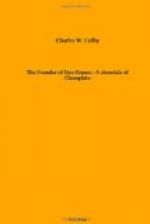In all essential respects Champlain seems to have been a good observer and an accurate chronicler. It is true that his writings are not free from error involving facts of distance, altitude, and chronology. But such slips as have crept into his text do not constitute a serious blemish or tend to impugn the good faith of his statements on matters where there is no other source of information. Everything considered, his substantial accuracy is much more striking than his partial inaccuracy. In fact, no one of his high character and disinterested zeal could write with any other purpose than to describe truly what he had seen and done. The seal of probity is set upon Champlain’s writings no less than upon the record of his dealings with his employers and the king. Unselfish as to money or fame, he sought to create New France.
In national progress much depends on the auspices under which the nation was founded and the tradition which it represents. Thus England, and all the English world, has an imperishable tradition in the deeds and character of Alfred the Great; thus Canada has had from the outset of the present stage in her development a great possession in the equal self-sacrifice of Montcalm and Wolfe. On the other hand, the nation is doomed to suffer which bases its traditions of greatness upon such acts as the seizure of Silesia by Frederick or Bismarck’s manipulation of the Ems telegram.
For Canada Champlain is not alone a heroic explorer of the seventeenth century, but the founder of Quebec; and it is a rich part of our heritage that he founded New France in the spirit of unselfishness, of loyalty, and of faith.
BIBLIOGRAPHICAL NOTE
Original Text
The best edition of Champlain’s own works, in the original text, is that of Laverdiere—’OEuvres de Champlain, pabliees sous le Patronage de l’Universite Laval. Par l’Abbe C.-H. Laverdiere, M.A. Seconde Edition. 6 tomes, 4to. Quebec: Imprime au Seminaire par Geo. E. Desbarats, 1870.’
The list of Champlain’s writings includes:
1. The ‘Bref Discours,’ describing
his trip to the West
Indies.
2. The ‘Des Sauvages,’ describing
his first voyage to
the St Lawrence.
3. The ‘Voyages’ of 1613, covering
the years 1604-13
inclusive.
4. The ‘Voyages’ of 1619, covering
the years 1615-18
inclusive.
5. The ‘Voyages’ of 1632, which represent
a re-editing
of the early voyages from 1603 forward,
and continue
the narrative from 1618 to 1629.
6. A general treatise on the duties of the mariner.
English Translations
1. The ‘Bref Discours,’ in a translation
by Alice Wilmere,
was published by the Hakluyt Society
in 1859.
2. The Des Sauvages (1604) was translated in
’Purchas
His Pilgrimes’ (1625).




